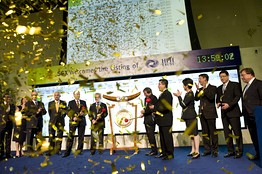HONG KONG (Dow Jones Investment Banker)- The report from Hong Kong’s Securities and Futures Commission (SFC) this week couldn’t have come at a more awkward time. Just as Singapore is mounting a challenge to Hong Kong’s dominance in Asian equity capital markets, the regulator has chastised brokers and banks for failing to meet standards as IPO sponsors. Hong Kong Exchanges and Clearing Ltd. (HKEx) thus finds itself in the spotlight at the same time it needs to defend its market share.
The SFC report found that sponsors have been too lax in meeting guidelines that have been in place for four years. A recent SFC inspection has highlighted issues associated with due diligence, disclosure, documentation and internal controls.
(Click HERE for news release and a link to the report)
This is not the first time IPO execution in Hong Kong has come under scrutiny. Last December, the decision to allow issuers incorporated in China to use mainland accounting standards and local auditors was widely criticized. HKEx justified it by pointing to market practice elsewhere.
The SFC’s report stemmed from an inspection of more than a quarter of Hong Kong’s 65 active sponsor firms between October 2007 and September 2009. Of these, six were registered banks that accounted for 39% of the US$284 million equivalent paid by issuers for sponsor work in 2009, including documentation, underwriting, pre-IPO financing and other fees. That figure would have increased considerably in 2010, as a result of the mega-IPOs in Hong Kong by AIA Group, Agricultural Bank of China Ltd. and others. Those six banks also employed over a third of the 1,640 licensed representatives and staff engaged in sponsor work, which was carried out on a joint basis on more than half of all IPOs.
The SFC’s findings highlighted failures to conduct proper interviews with major customers and suppliers, and to investigate events after the balance-sheet date; problems with identification of related-party transactions; insufficient manpower for sponsor work; inadequate assessment of the work carried out by third parties; and assorted other issues.
The exchange and regulator – itself in the midst of a senior management change, as CEO Martin Wheatley prepares to leave – have already been criticized by politicians and local luminaries for having lost the listing of Hutchison Whampoa Ltd.’s US$5.45 billion business trust IPO to Singapore’s SGX.

The announcement by PCCW Ltd., Hong Kong’s leading telecommunications operator, on March 29 that “it is still in discussions” with HKEx and the SFC “regarding the possibility of listing a business trust in Hong Kong,” which the firm says is “its preferred option,” reads like a warning that Singapore remains an alternative.
The delay in the IPO of Cheung Kong’s proposed yuan-denominated REIT, Hui Xian, as the SFC has asked for further clarifications, may put further pressure on Hong Kong as a financial center to demonstrate its capacity to innovate.
The SFC report will be a godsend for the New York Stock Exchange and Nasdaq, which have been losing ground with foreign private issuers, as Sarbanes-Oxley disclosure and costs, and recent reports on controversial reverse mergers by Chinese issuers, have taken their toll. The London Stock Exchange, which is said by observers to have been chosen over HKEx as the primary exchange for Glencore’s upcoming US$10 billion-plus dual-listed flotation, will benefit too.
The blow-out IPO in New York this week of China’s Qihoo 360 Technology, although small, may further encourage others to head West.
(Philippe Espinasse worked as an investment banker in the U.S., Europe and Asia for more than 19 years and now writes and works as an independent consultant in Hong Kong. Visit his website at https://www.ipo-book.com. Readers should be aware that Philippe may own securities related to companies he writes about, may act as a consultant to companies he mentions and may know individuals cited in his articles. To comment on this column, please email [email protected]).
[This article was originally published on Dow Jones Investment Banker on 31 March 2011 and is reproduced with permission. It also appeared on WSJ.com, the website of The Wall Street Journal].
Copyright (c) 2011, Dow Jones & Company, Inc.
